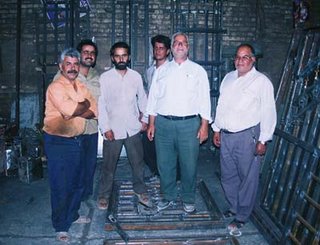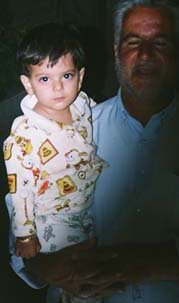Last week I watched a mullah walk down the street in Tehran. The bottom of his skirt just touched the sidewalk as he glided through the people with a body language that whispered calm and superior. I made a snap decision that mullahs aren't in touch with the people.
Then I got a lesson in mullah behavior at the Theological University in Shiraz. I am now enlightened.
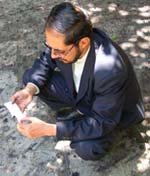
As our group learned about the history of the mosque and the university, a plain-clothed
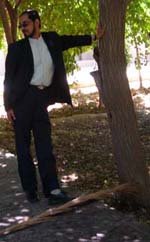
cleric-in-training approached and shook down some mulberries from the tree for myself and another American. A sweet gesture, we chatted in sparse English as he produced a little-black-book from his pocket. The page I saw had English-Farsi translations for: "Are you married?" and "How long will you be here?" So, mullahs can marry. I am enlightened.
We also had the fortunate circumstance to ask some questions of a revered rouhani (aka mullah or cleric), Agha Ansari.Born in the south of Iran and coming from a long line of mullahs, this good-natured 30 year-old man stood tall and relaxed as he spoke. Given that we were spontaneous guests, we did not cross-examine nor dig into any complicated issues.
*************
Q: Since all women are mandated to wear hejab (head and body coverage), religious women cannot express their devotion to Islam and differentiate themselves from the crowd. Why isn't there a choice in deciding to wear hejab?
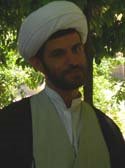
A: Women have a choice. Some women wear full chador expressing their dedication to Islam, other women wear shorter scarves of any color and design expressing their individuality. We see our religion as a social connection that protects our culture, bringing us all together as Iranians, making our nation stronger. Hejab is part of our religion. It is an obligation to Islam.
**************
Q: What is your opinion of the current situation between U.S. and Iran?
A: The levels of uranium being enriched are only a small percentage of what is needed to create a nuclear bomb. The U.S. knows that Iranian bombs cannot reach the states, therefore they are using Iran's minimal nuclear involvement to create fear so they can change our way of life with force.
The age of force has left us. Force is from the middle-ages when we had slaves. We now must use logic and intellect, not weapons of war. No country will go on with force as their agent.
The current U.S. leaders aren't able to see this logic. Our goal as clerics is to bring more intellectuals and academics to the table so we can work on our communication with the U.S. and other countries. It's your job to go back to the U.S. and tell of our intentions for discussion and peace.
*************
Watching his unassuming body language and hearing his logic, I felt guilty for having that earlier prejudicial opinion of mullahs. I'm sure it takes all kinds, and mullahs are no exception, but I wish I could've found a way to tell him in Farsi that because of him I was enlightened.
As the conversation wrapped up, he announced his email as
...@yahoo.com - it's not often you hear the voice of an Islamic cleric speaking in capitalist terms!
As it turns out, "Yahoo!" is actually a way that Suffi mystics call on God. So maybe there is an existing link between our two cultures after all.
Well, Yahoo!
 I've been in a movie-mood lately.
I've been in a movie-mood lately.










